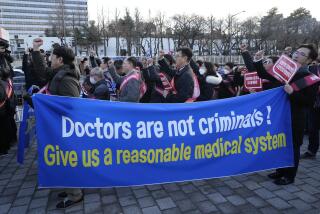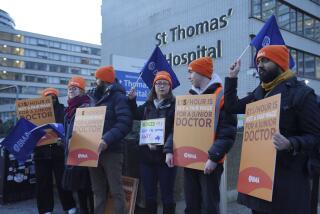Ontario Lawmakers Vote to Curb Doctors’ Fees
TORONTO — The Ontario legislature Friday ignored threats by striking doctors that they would intensify their protests and approved a law barring physicians from charging patients more than the fees set by the government health insurance program.
Under the urging of the Ontario Medical Assn., about half of the province’s 15,000 active doctors have been on strike since June 12 in an effort to force the government of Premier David Peterson to withdraw the bill.
In spite of the lack of full support, the striking physicians have disrupted hospital services in several communities, closing down an average of 11 to 13 hospital emergency rooms a day on a rotating basis. Ontario province has about 100 hospitals.
Although the strike failed to stop the bill from becoming law, the doctors vowed Friday afternoon to continue their walkout. Dr. Richard Railton, president of the medical association, told reporters that “the strike is still on. . . . Backing down now would give absolutely the wrong signal to the government and the people.”
Railton also said that the medical association will sue the government on grounds that the law violates the constitutional rights of doctors by constricting their right to deal in freedom with their patients.
“It has to be drawn to the attention of the people that this is a bad bill,” he said. “We feel we have a just cause.”
But Premier Peterson, whose Liberal Party and its ally, the New Democratic Party, were elected partly on a pledge to end overbilling, as the practice of charging beyond the government’s insurance payment schedule is called, refused to give ground.
He told reporters after the 69-47 vote that the law would be enforced immediately. Any doctor who charges more than the insurance payment set by the government is liable to an initial fine of $179 and a fine of $717 for each subsequent violation.
The law, which was introduced last year and debated for 23 days in the legislature, even applies to doctors who withdraw from the health insurance program and bill their patients directly.
Doctors argue that the dispute is not about money but centers on their loss of freedom to deal with their patients. They note that only about 5% of the province’s physicians overbill, and they acknowledge that the average yearly income of $93,200 makes them the best-paid group in Canada.
“But they (the government) don’t have the right to tell us how to deal with our patients. . . . This is just the first step in government intervention that will kill this system,” said one doctor standing outside the Ontario Legislative Building before the vote.
Peterson later denied that the government has “a hidden objective.” He said the only motive was to ensure that all citizens receive equal medical care regardless of their ability to pay.
The bill also was needed to stop the federal government from withholding payments to the province as punishment for allowing overbilling. Under the Canada Health Act, any province permitting extra charges loses a dollar in federal payments for every dollar that doctors overbill. Ontario has lost $71 million since 1984.
So far, the strike has not caused any widespread or fatal incidents, although some examples of patients being turned away from emergency rooms have been reported.
Also on Friday, most of Quebec province’s 18,000 nurses staged an illegal, 24-hour strike to protest their pay. Although most hospitals in that province had to postpone elective surgery, no other serious disruptions were reported.
More to Read
Sign up for Essential California
The most important California stories and recommendations in your inbox every morning.
You may occasionally receive promotional content from the Los Angeles Times.










